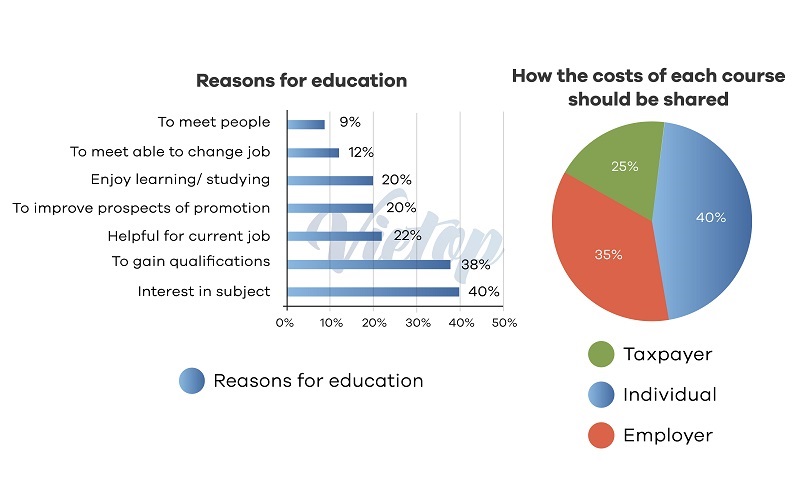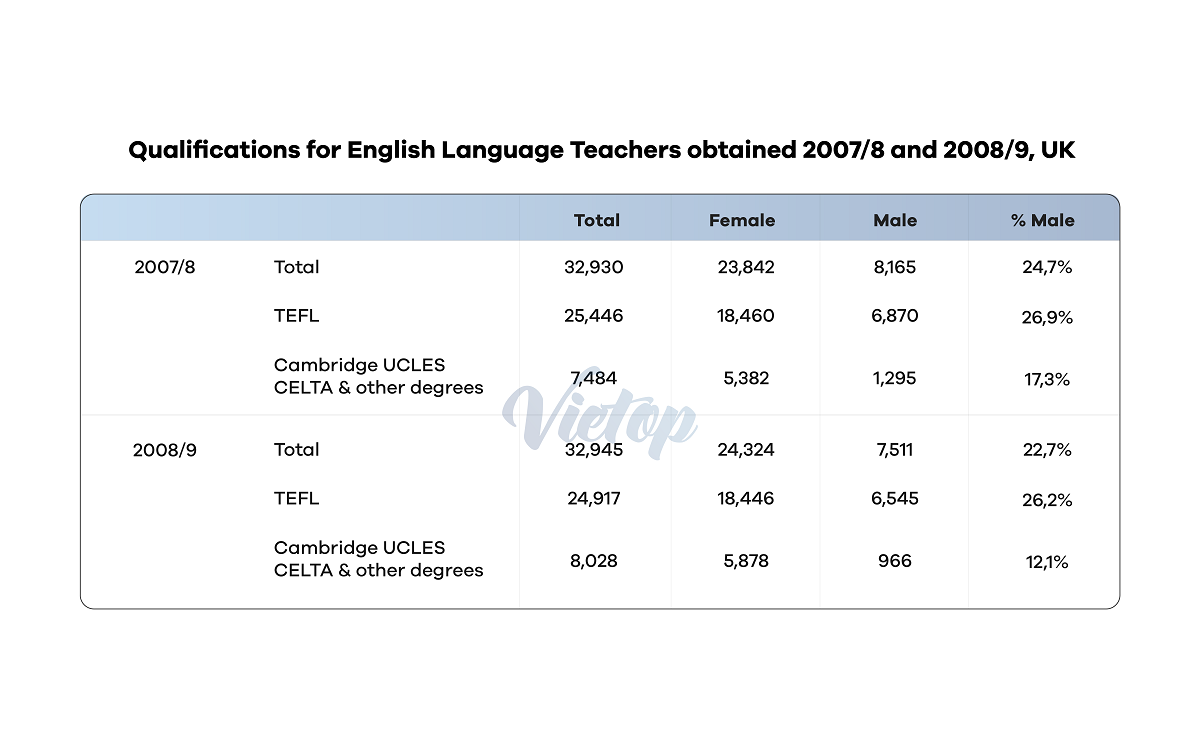Vậy nên, hôm nay Vietop sẽ gửi đến bạn bài mẫu Education Task 1, 2 về chủ đề này, cùng xem và lưu lại để ôn tập và rèn luyện kỹ năng IELTS Writing nhé!
IELTS Writing Task 1
Sample 1
| Task 1: The charts below show the results of a survey of adult education. The first chart shows the reasons why adults decide to study. The pie chart shows how people think the costs of adult education should be shared. |

Tham khảo thêm: Trọn bộ đề IELTS Writing task 1 và IELTS Writing Task 2 qua từng năm
Sample
The bar chart displays why adults opted to study, while the pie chart depicts people’s thoughts on the tuition fee distribution of the study mentioned before.
Overall, the two primary reasons why individuals have maintained their education, according to the poll results, are because they are interested in subjects and to get a degree. It should also be noted that the majority of school expenditures should be covered by individuals themselves, according to the study.
It can be shown that the two primary reasons why adults continue their education are because they are interested in the program and to get a certificate, since these two factors accounted for 40% and 38%, respectively. Meanwhile, the percentages of respondents who said the survey was useful for their present work, improved their prospects for advancement, or that they like learning ranged from 22 percent to 20 percent. The percentage of persons who study for the goal of changing employment or meeting new people was less than 15%.
In terms of course fees, 40% of poll respondents believe that adult education costs should be borne by individuals. Only one-fourth feel it should be collected from taxpayers’ money, while over a third say their employers should bear the obligation.
Vocab
- Opt (v): lựa chọn
- Borne (quá khứ của Bear): chịu đựng
- Obligation (n): nghĩa vụ
Xem thêm:
Sample 2
| Task 1: The chart below shows the number of men and women in further education in Britain. |

Sample
The graph shows the quantity of men and women enrolled in tertiary education in Britain throughout three time periods: 1970–1971; 1980–181; and 1990–1991; as well as whether their studies were full–time or part–time.
Overall, the graph illustrates the fact that more men and women studied part-time than full-time throughout each period. However, whereas the number of women enrolled in courses of all kinds increased dramatically across the years depicted, the number of men enrolled in part-time studies shrank rather marginally.
Initially, men who were enrolled in full-time education increased by 200 thousand from 100 thousand in 1970–1971 to 200 thousand in 1990–1991 throughout the course of the period. The number of women pursuing this type of education was likewise approximately the same, which was significantly greater than the figure of around 40 thousand in 1970/71.
In terms of part-time study, there was a significant increase in the proportion of female students, who went from 700 thousand to 1.1 million, the greatest number ever recorded for any type of study. The number of men enrolled in part-time studies, on the other hand, decreased by 100 thousand during this time, from 1 million to roughly 800 thousand between 1970/71 and 1980/81, before rising to 900 thousand in 1990/91.
Sample 3
| Task 1: The table below shows the number of students living in the UK gaining English language teacher training qualifications in 2007/8 and 2008/9, and the proportion of male qualifiers. |

Sample
The table compares how many British residents were qualified to be English teachers and the course completion statistics according to gender between 2007/8 and 2008/9.
Overall, there was a negligible increase in the qualifier total, of which the number of TEFL holders consistently outdid those obtaining Cambridge UCLES CELTA and other degrees.
Regarding the total statistics, an over-500-student fall was seen in TEFL from around 25,000 in 2007/8. An opposite trend was recorded in the figure for Cambridge UCLES CELTA and other degrees, climbing to over 8,000 in 2008/2009.
Furthermore, the majority of students studying to become English teachers were females. Around 18,500 women completed TEFL courses in each of the academic years, compared to the figure for men which always accounted for less than 27% of the TEFL holders. While the number of female students gaining Cambridge UCLES CELTA and other degrees rose by approximately 500 to around 5,900 in 2008/9, the figure for male students holding these degrees experienced a 25% drop to under 1000 during the same period.
Vocab
- Be qualified to do something: đủ trình độ để …
- Course completion statistics (n): thống kê về việc hoàn thành khóa học
- TEFL holder (n): người có chứng chỉ TELF
- Hold a degree (v): có một bằng cấp nào đó
Phân tích
Số người có chứng chỉ TEFL luôn áp đảo số người có các bằng cấp khác; Trong khi số người lấy chứng chỉ TEFL giảm thì số người lấy các bằng cấp khác tăng. Nhìn chung, phần lớn người học để trở thành giáo viên tiếng Anh là nữ.
Xem thêm:
Tổng hợp đề thi IELTS Writing 2023 kèm bài mẫu chi tiết – Cập nhật liên tục
Tổng hợp đề thi IELTS Writing 2022 và bài mẫu – Cập nhật liên tục
Sample 4
| Task 1: The charts below show the levels of participation in education and science in developing and industrialised countries in 1980 and 1990. |

Sample
The bar charts compare the number of years of schooling, the number of scientists and technicians, and expenditure on Research and Development in developing and industrialised countries between 1980 and 1990.
Overall, while the figures for most of the categories increased, the industrialised group outdid the developing one in all statistics.
It is clear from the first graph that the average number of years of schooling in developing countries was around 2, a fourth of industrialised countries’ number. The gap between these countries widened after a decade as their figures grew to over 3 and 10 years, respectively.
Regarding the second graph, there were 45 scientists and technicians per 1000 people in industrialised nations, which climbed by 30 in 1990. Having doubled after ten years, the developing group’s figure remained modest at 20 scientists and technicians in 1990.
Finally, 150 billion US dollars was allocated to research and development projects by industrialised countries in 1980, and this spending had a 200-million surge in the following decade. By contrast, developing countries initially spent 50 million on the same category but ultimately halved the expenditure in 1990.
Vocab
- Outdid (v): Vượt trội hơn
- The gap between … widened: Khoảng cách giữa … mở rộng
- Half (v): Giảm một nửa
- Expenditure (n): Chi tiêu
Phân tích
Nhìn chung, trong khi số liệu của hầu hết các nhóm đều tăng, nhóm các nước phát triển đều vượt trội so với nhóm đang phát triển trong tất cả các số liệu thống kê.
Vì cả 3 biểu đồ đều thể hiện hình dạng tương đương nhau, nên lưu ý cách sử dụng cấu trúc, từ vựng để tránh bị lặp.
Xem thêm: Cách làm dạng bài Bar Chart IELTS Writing Task 1 “chuẩn” bạn cần biết
IELTS Writing Task 2
Sample 1
| Task 2: Subjects such as Art, Sport and Music are being dropped from the school curriculum for subjects such as Information Technology. Many children suffer as a result of these changes. To what extent would you support or reject the idea of moving these subjects from the school curriculum? |
Sample
Some universities have changed their curriculum and prioritised technological topics over fields of knowledge including Arts, Music, and Sports, causing many students to suffer. I fundamentally disagree with the concept of abandoning these vital subjects in order to promote technology, which would be elaborated in the following essay.
To begin with, not all pupils are capable of dealing with technological issues. This is because some people are interested in computers while others are more interested in music, drama, reading, acting, singing, and so on. Involving pupils in extracurricular activities also helps them improve their attentiveness, which helps them achieve academically. A youngster with interests in history, theatre, and the arts, for example, may find such talents valuable when deciding on a vocation.
Similarly, as compared to students with merely technical degrees, youngsters with traditional backgrounds and interests in arts, music, and history have more prospects to create a career. Furthermore, integrating disciplines like Arts, Music, and Sports might be useful to youths in the long term. Sports help people stay active and live a healthy lifestyle. Furthermore, leisure activities are valued higher in various educational institutions and businesses, which increases the chances of pupils being admitted to a reputable college. To illustrate, many celebrities in Vietnam have studied at prestigious institutions and are now well-known in society.
To summarise, I oppose the intention to remove extracurricular topics from the curriculum, as this may assist pupils enhance their mental health and general personality development. Furthermore, this opens up a plethora of prospects for them in the future.
Xem thêm: Cách làm dạng bài IELTS Writing Task 2 – Agree or Disagree chi tiết
Vocab
- Field of knowledge (n): lĩnh vực, ngành học
- Extracurricular activities (n): các môn học ngoài khung chương trình chính
- Technical degree (n): bằng cấp chuyên về kỹ thuật
- Prestigious institution: cơ sở đào tạo danh tiếng
Sample 2
| Task 2: Good teaching is more important for scholastic success than individual ability. To what extent do you agree or disagree? |
Sample
Along with the development of contemporary society, education has been receiving more attention from the public. There is an opinion that academic achievement is more dependent on effective teaching than on a student’s inherent talent. During the course of this essay, I would discuss this perspective in an objective manner before drawing on a rational conclusion.
Fundamentally, a segment of society supports the idea that a tutor’s ability to instruct students directly affects scholastic development. Undoubtedly, top-notch teachers help students succeed scholastically by identifying their weaknesses and providing precise guidance. To be specific, professional teachers frequently have experience and competence, thus they are more likely to be able to advise students on how to raise their academic standing. In other words, these teachers might help students identify their weaknesses—flaws that they might overlook or ignore—and then construct lessons that are specific to their needs, giving them a better grasp of how to raise their academic performance. Students who carefully follow these guidelines are more likely to succeed academically.
On the other hand, the individual ability of students to perceive the lessons should not be subjected to underestimation. Initially, in order to utilise the provided lessons from the teacher to the fullest potential, the students are required to possess the ability to maintain resilient attention both in class and at home. This skill is particularly vital as a day at school for most students in Vietnam is conventionally long and followed by a host of extra classes. On top of that, under the circumstance that a learner merely processes the given knowledge by the teachers in a passive manner without the capability to ignite, create, and maintain their own learning progress, this student could only become a version of being successful as their teachers have intended, with personalisation being totally absent.
To conclude, regardless of the significance of having the finest teachers conducting the education progress, a learner without certain key abilities would face immersive challenges toward educational success.
Vocab
- Inherent (adj): bẩm sinh
- Precise guidance (n): sự định hướng chính xác
- Competence (n): năng lực
- Resilient (adj): kiên định
- Ignite (v): bắt đầu
Xem thêm: Khóa học IELTS và luyện thi IELTS cấp tốc được nhiều bạn tại TPHCM theo học nhất – Cùng tìm hiểu ngay nhé
Sample 3
| Task 2: Some people say that school education is not useful and the essence of study can be acquired at home. To what extent do you agree or disagree? |
Sample
It is argued that home education may replace formal education at school, the effectiveness of which is doubted. I personally disagree entirely with this viewpoint.
Homeschooling is supported on the grounds that it can be exclusively designed and adjusted based on learners’ strengths, weaknesses and goals. That facilitates the nurture of their inborn talent and ensures the chosen subjects and teaching methods arouse their interests. Most parents, however, lack professional training to plan courses and lecture lessons, necessitating syllabi written by private tutors. Without healthy finance to afford long-term expert consultancy, the quality of home teaching may not be guaranteed. Even more concerning is that homeschooled children often fail to obtain social skills since there are few chances to communicate and interact with friends of the same age.
On the other hand, the dominance of orthodox education is justified for several significant reasons. Most formal curricula and examinations developed by leading educators are delivered and graded by highly trained teachers. School facilities, including laboratories and libraries, offer a vast source of educational materials, while spaces like atria and amphitheatres on the campus liven learning with extra-curricular activities. All of these provide more leading educational results in return.
It is also important to note that youngsters cannot proceed to university without a high school diploma in most countries due to regulatory barriers. Therefore, their future careers, especially those which require academic knowledge and skills acquired during tertiary education, such as doctors and scientists, are unlikely to be ensured.
In conclusion, though flexible, homeschooling may not reach the standards of school education that necessitate professionals, facilities, and qualifications for one to succeed in life.
Vocab
- Formal education (n): giáo dục chính quy
- Homeschool (v): dạy học tại nhà
- Orthodox education (n): giáo dục chính thống
- High school diploma (n): bằng tốt nghiệp trung học
- Regulatory barrier (n): rào cản về quy định
- Tertiary education (n): giáo dục cao đẳng/đại học
Xem thêm: Khóa học IELTS Online – Học trực tuyến cùng chuyên gia IELTS 8.5
Phân tích
Quan điểm: hoàn toàn không đồng ý
- Giáo dục tại nhờ cần sự tham vấn của chuyên gia trong dài hạn do phần lớn phụ huynh không có kỹ năng sư phạm. Điều này đòi hỏi nhiều điều kiện tài chính.
- Trẻ được giáo dục tại nhà có thể thiếu những kỹ năng xã hội cần thiết do có ít cơ hội tiếp xúc với các bạn đồng trang lứa.
- Giáo dục chính quy hiệu quả hơn do chương trình học được nghiên cứu cẩn thận, các giáo viên có chuyên môn và đầy đủ cơ sở vật chất giảng dạy.
- Nhiều nước quy định phải có bằng tốt nghiệp trung học mới có thể vào đại học. Không vào được đại học có thể ảnh hưởng các triển vọng nghề nghiệp sau này.
Xem thêm:
6 Cách Paraphrasing trong IELTS Writing siêu hay
Các cụm từ cần tránh trong IELTS Writing
Cách viết Advantage and Disadvantage trong IELTS Writing Task 2
Sample 4
| Task 2: Some people think that children who spend a lot of time reading children’s story books are wasting their time which could be better used doing other more useful activities. To what extent do you agree? |
Sample
Some argue that storybooks do not benefit children in any way, so they should instead engage in other more useful activities. Whilst I can understand why people believe reading storybooks to children is a waste of time, I completely oppose this point of view.
On the one hand, some people argue that reading storybooks for children is a waste of time because they believe it does not offer any benefits. They argue that other activities, such as sports, clubs, or other hobbies, are more productive and can help children develop important social and physical skills. Additionally, some people believe that reading children’s storybooks may distract children from more important tasks, such as completing their homework or studying for exams.
On the other hand, it is undeniable that reading stories offer obvious benefits that influence one’s long-term development. Linguistic merits, including vocabulary enrichment and improved reading comprehension, can be gained through stories of different topics and levels of difficulty. They are essential for children’s effective communication and learning in school. Another advantage is that curiosity and imagination, which motivate children to explore the world, are nurtured with storybooks. Such books are also a source of interesting, well-illustrated knowledge, which may complement academic lessons in class. Finally, some parents read stories and discuss characters with their children for more bonding time and opportunities to educate them at home.
In summary, despite the claim that other after-school activities, instead of reading stories, are essential for children’s upbringing, I am convinced that storybooks are highly beneficial for their mental abilities and make them closer to their family members.
Từ vựng
- Distract someone from something (v): Làm ai xao lãng chuyện gì
- A linguistic merit (n): Lợi ích về ngôn ngữ
- Vocabulary enrichment (n): Làm giàu vốn từ vựng
- Reading comprehension (n): Khả năng đọc hiểu
- Complement (v): Bổ sung
- Upbringing (n): Sự dạy dỗ
Phân tích
Bài viết nêu lên 2 mặt của cùng một vấn đề, được trình bày trong từng đoạn của phần thân bài.
Một số người cho rằng đọc sách truyện cho trẻ em là lãng phí thời gian sách truyện dễ khiến trẻ xao nhãng việc học tập và ăn ngủ. Tuy nhiên việc đọc truyện cũng mang lại những lợi ích về ngôn ngữ, giao tiếp và học tập của trẻ. Việc đọc nhiều cũng làm gia tăng trí tưởng tượng, giúp trẻ khám phá thế giới xung quanh, cũng như giúp cha mẹ gắn kết với trẻ hơn.
Đối với các dạng bài viết có tính chất liệt kê như trên, cần lưu ý sử dụng các từ chỉ thứ tự: Firstly, secondly,… hoặc các từ chỉ mức độ tăng tiến: Moreover, in addition để phân hoá rạch ròi giữa các luận điểm.
Hy vọng bài mẫu trên sẽ giúp ích được bạn trong quá trình ôn tập IELTS. Nếu bạn có thắc mắc về topic trên, hãy để lại bình luận bên dưới để được giải đáp nhé. Chúc bạn sớm đạt được band điểm mong muốn!
Xem thêm:
Bài mẫu IELTS Writing Task 1 + 2 – Topic: Line + Environment
Bài mẫu IELTS Writing Task 1 + 2: Cinema Viewing figures + Communication
Bài mẫu IELTS Writing Task 1+ 2: Reasons for moving houses + Globalization

![[ACE THE TEST] Giải đề IELTS Writing ngày 06/04/2024 5 [ACE THE TEST] Giải đề IELTS Writing ngày 06/04/2024](https://www.ieltsvietop.vn/wp-content/uploads/2024/04/giai-de-ielts-writing-ngay-06-04-2024.jpg)
![[ACE THE TEST] Giải đề IELTS Writing ngày 23/03/2024 6 Giải đề IELTS Writing ngày 23/03/2024](https://www.ieltsvietop.vn/wp-content/uploads/2024/03/giai-de-ielts-writing-ngay-23-03-2024-thumb.jpg)
![[ACE THE TEST] Giải đề IELTS Writing ngày 16/03/2024 7 [ACE THE TEST] Giải đề IELTS Writing ngày 16/03/2024](https://www.ieltsvietop.vn/wp-content/uploads/2024/03/giai-de-ielts-writing-ngay-16-03-2024.jpg)
![[ACE THE TEST] Giải đề IELTS Writing ngày 07/03/2024 8 [ACE THE TEST] Giải đề IELTS Writing ngày 07/03/2024](https://www.ieltsvietop.vn/wp-content/uploads/2024/03/giai-de-ielts-writing-ngay-07-03-2024.jpg)
![[ACE THE TEST] Giải đề IELTS Writing ngày 09/03/2024 9 [ACE] Giải đề IELTS Writing ngày 09/03/2024](https://www.ieltsvietop.vn/wp-content/uploads/2024/03/giai-de-ielts-writing-ngay-09-03-2024-thumb.jpg)
![[ACE THE TEST] Giải đề IELTS Writing ngày 03/02/2024 10 [ACE THE TEST] Giải đề IELTS Writing ngày 03/02/2024](https://www.ieltsvietop.vn/wp-content/uploads/2024/03/giai-de-ielts-writing-ngay-03-02-2024-thumb.jpg)



